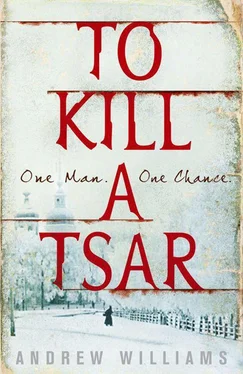It was the first night Anna had spent in the Nevsky flat and she was a little shocked to discover she was to sleep on a pallet in the kitchen while her comrades shared the only bed. Morozov and Liubatovich were dedicated revolutionaries with long police histories, but they had chosen to ignore the party’s strictures against intimate relationships and had become lovers. She wondered at their audacity. It was Nikolai Morozov who had written the manifesto with its emphasis on personal sacrifice. Would he leave Olga if the executive committee required it of him? The opportunity to express deeper feelings, sexual love; she could not help but feel envious. She was alone on a hard mattress, the mice scratching at the skirting boards close to her head. It was more than two years since she had last seen her husband, Stepan — the marriage was over and she was glad of it. But after weeks of frantic activity preparing for the attack, the fear and the loneliness, the role of revolutionary ascetic seemed harder to play than it had before. Life might end tomorrow before she heard a man say, ‘I love you,’ and mean it. Shaken along endless miles of track, in daydreams and through restless nights, one man had whispered love to her and she had imagined what it would be to share a bed with him and feel his body pressed to hers. But this man was beyond her reach. Clever and different in many ways that frightened her, how could they love when he was not of the same mind? ‘No. Not one of us,’ she thought, ‘not one of us.’ Olga and Nikolai were fortunate to have found each other. But the comfort of others was no comfort to her and the longing for affection and closeness was still with her when she woke cold and stiff in the morning.
Anna had resolved to leave for the village straight after breakfast and had packed her few possessions before the others began to stir. Olga was the first to rise, a man’s padded smoking jacket over her nightgown. She was a peculiarly masculine-looking woman with a full mouth, weak chin and heavy eyebrows that met above a Roman nose. Not at all handsome but formidably clever, and her comrades admired her independence of thought and strength of purpose. She was only twenty-five but after years of prison and internal exile, she had the air of someone older and more worldly wise.
Nodding to Anna, she reached for the cigarette case she had left on the kitchen table the night before and lit one with obvious pleasure. Only when she had drawn deeply upon it two or three times was she ready for conversation. Olga’s appetite was already legendary, and once the small range was lit she set about frying eggs, the cigarette hanging loosely from her mouth. She was on the point of serving them when they were surprised by a quiet but urgent rapping at the door.
‘Don’t open it!’ It was Morozov from the bedroom next door. Seconds later he joined them, blinking myopically, his long hair tousled, spindly legs beneath his greatcoat.
‘The revolver!’ he hissed at Olga.
But before she could open the table drawer the knocking began again and this time they heard Sophia Perovskaya’s high pitched voice. ‘It’s me. I need to speak to you.’
Anna opened the door at once and Sophia almost fell into the room. ‘It’s Kviatkovsky! The police are going to raid his apartment.’ She had run up the stairs and was still gasping for breath, her eyes wide with alarm.
‘How do you know?’ asked Morozov.
‘A note from Mikhailov… we must warn him! There are papers… but it may be too late. I can’t go — Alexander can’t go…’
‘Here.’ Anna pulled her towards a chair. ‘I’ll go now.’
‘No,’ said Morozov. ‘It’s too dangerous. I will ask Maria Oshanina to go. She’s clean. The gendarmes have nothing on her.’
‘I’m clean,’ said Anna crossly. ‘There’s no time to waste.’
‘Too much of a risk. You’re a friend of Goldenberg’s. And you know too much.’
‘Anna’s right. Someone must go now.’ Olga was already moving towards the bedroom.
‘But not you or Sophia. It’s too dangerous,’ said Morozov with alarm.
‘No. It has to be Anna,’ she shouted through the half open door. ‘But I’m going to wait in the lane in case…’ She did not need to finish the sentence. They knew what she meant.
A little after eight o’clock in the morning, Nevsky was bustling with traffic — workers on the way to the Admiralty yards and the factories on Vasilievsky, civil servants to the great ministries — and it was a while before they were able to hail a droshky. There was a biting wind from the north-east carrying with it a flurry of snow, and Olga put her arm about Anna to share the warmth of her body, pressing her close.
‘If the police stop you tell them you are delivering a message from me to the dressmaker at Number 8,’ she whispered. ‘Nikolai and I have cover papers in the name of Khartsov.’
The driver dropped them at last at the corner of Zagorodny and Leshtukov Lane. It was a respectable part of town, popular with junior army officers and their families and doctors at the nearby hospital. Kviatkovsky was another of the gentleman revolutionaries and one of the most influential. The apartment he shared with Evgenia Figner was in a handsome yellow and white four-storey mansion in the middle of the lane. Anna knew the block well.
They hurried along Leshtukov in silence, arm in arm, their faces almost covered by their scarves. Mittened and muffled children were throwing snowballs at each other as they made their way to school. A dvornik was scraping snow from his yard into the street and an old lady, a black bundle in coat and shawl and hat, was inching unsteadily along the frozen pavement towards them with a shopping basket. There was no sign of gendarmes or the city police. A short distance from the mansion, Olga pulled Anna into an open yard: ‘I’ll wait here.’ She leant forward and kissed her on the lips. ‘Be careful, comrade.’
Kviatkovsky’s grand apartment was on the third floor, with a fine gallery window over the street. Nothing appeared out of place. Anna turned under the carriage arch into the yard and walked with purpose towards the back entrance and the servant’s staircase. Gazing up at the back of the block, she could see no sign of a parasol, the signal that was to be posted in a window when it was safe to visit. One foot lightly in front of the other, she began climbing the stairs, pausing after a few seconds to listen for voices or boots or the clatter of a rifle butt. At the door to the third-floor landing, she stopped and listened, but could hear only the faint trundle of a passing carriage in the street and the ferocious beating of her heart. It was no time for timidity; a deep breath, her small gloved hand firmly on the door knob, and she turned it quickly and stepped on to the landing. There was no one there. Kviatkovsky’s door was closed and there was nothing out of the ordinary — muddy footprints on the tiled floor, scratches on the varnished door, a splintered frame — nothing to suggest there had been a struggle. Perhaps there was still time. With another deep breath she stepped forward and rang the bell. At once, the door jerked open to reveal a portly middle-aged man in the black uniform coat of the city police.
‘Oh, I’m sorry,’ she said, almost falling against the stair rail. ‘Goodness, you made me jump. I was told the dressmaker lives here.’
‘No, miss, the dressmaker lives in the apartment opposite.’
‘Oh, how silly of me.’
‘Sergeant Kirill Korovin, at your service.’
‘I need the dressmaker,’ said Anna, turning away.
‘I am afraid my orders are to take anyone who calls at the apartment to the station and I always obey my orders. Why don’t you come in?’ He stood aside to let her into the apartment.
Читать дальше












